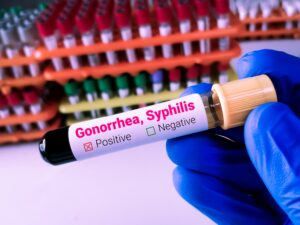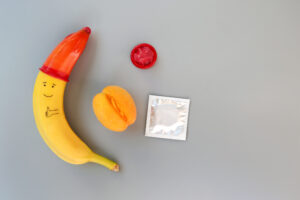The Itchy Guide To STIs and Testing

This blog looks at what an STI is, how to know if you have one and what to do if you think you do. It looks at what happens at a sexual health clinic, how to test at home and when to get tested.
WARNING: Due to the nature of the subject, some of the content in this blog may not be suitable for some of our younger readers.
This blog is part of our No Shame No Secrets – Sexual Health and Wellbeing Campaign, where we look at many different elements of keeping yourself sexually healthy and safe. You’ll find links to all our campaign blogs here, and follow our social media channels (see bottom of blog) to watch some fun videos.
If you’re worried about anything and would like to talk it through, our advisers at Meic are happy to talk to you free and confidentially between 8am and midnight every day. We won’t judge and can help you figure out your next steps. Details at the bottom.
What’s an STI?
An STI means a Sexually Transmitted Infection, an infection passed from one person to the next, usually through unprotected sex. Sometimes people use the term STD (sexually transmitted disease).
There are lots of different STIs out there. These include:
How do I know if I have an STI?
There are lots of different symptoms, depending on the STI. Sometimes there are no symptoms at all. Here are some symptoms that could indicate that you have an infection:
- Pain when peeing
- Unusual discharge from the genitals or anus
- Tummy ache
- Bleeding between periods
- Sore, painful, or swollen testicles or vagina
- Pain when having sex or bleeding afterwards
- Lumps or blisters on your genitals
- Tingling, burning or itching genitals
- Flu-like symptoms
Don’t panic! Some of these symptoms could be caused by something else, but if you’ve had unprotected sex, getting tested is a good idea.
As some STIs don’t show any symptoms, the NHS recommends getting an STI test every year if you’re sexually active. If you’re worried that you may have caught an STI, take a test as soon as possible and use a condom to protect yourself and your partner/s until you get your results.
What do I do if I suspect I have an STI?
Most STIs are curable, so don’t panic. There are two things you can do. You can book to visit your local sexual health (or GUM) clinic or take a home test. Some STI clinics have drop-ins, but you might need to make an appointment. Contact them to find out.
To find your nearest sexual health or GUM clinic, click on the link to your local Health Board below:
- Blaenau Gwent, Caerphilly, Monmouthshire, Newport, Torfaen – Aneurin Bevan University Health Board
- Anglesey, Gwynedd, Conwy, Denbighshire, Flintshire, Wrexham – Betsi Cadwaladr University Health Board
- Cardiff and Vale of Glamorgan – Cardiff and Vale University Health Board
- Bridgend, Merthyr Tydfil, Rhondda Cynon Taf – Cwm Taf Morgannwg University Health Board
- Carmarthenshire, Ceredigion, Pembrokeshire – Hywel Dda University Health Board
What happens at a sexual health clinic?
Sexual health clinics specialise in sexual health. The staff deal with STIs every day, so you don’t need to be embarrassed. They won’t judge you and will explain everything, give you advice and test and treat you confidentially and free of charge.
They will ask for your name and contact details. You can give a false name if you like, but you need to give your real contact details so they can contact you with your results. You don’t have to worry as they keep everything confidential – they won’t even tell your GP without your permission.
You’ll be asked about your medical and sexual history – again, you don’t have to be embarrassed; they do this every day and have heard it all!
The nurse or doctor will decide which test you need. Depending on what they are testing for, this could be a urine or blood sample, swabs from your urethra or vagina (you carry out a vaginal swab yourself) or an examination of your genitals.
If you test positive, they’ll ask you to return to the clinic to discuss treatment. They’ll also ask you to tell anyone that you’ve been sexually intimate with so that they can get tested. You don’t have to do this yourself if you don’t want to; the clinic can notify people for you and won’t tell them who you are.
There’s more about testing for different STIs and visiting an STI clinic on this NHS page.
What’s a home test kit?
The Test and Post service is currently being tested in Wales by the NHS. They send free test kits for Chlamydia. Gonorrhoea, HIV, Syphilis, and Hepatitis B or C to your home in discreet packaging.
Depending on the STI you are testing for, you’ll either do a urine or blood test or take a vaginal, throat or rectum swab.
The kit will arrive in 3-5 days, and the results should be with you within 3 weeks of returning the kit. If everything is negative, then a text message will be sent with this information. If any of your tests are Positive, your sexual health service will contact you to arrange treatment.
Find out more about the NHS Test and Post Service here.
When to get tested
If you’re worried that you may have caught Chlamydia or Gonorrhoea, you should wait two weeks after having unprotected sex to take the test. Take the test too soon, and it won’t show a positive result.
If you want a HIV test, you need to wait 7 weeks until you have sex without a condom, as HIV will not show a positive result before then. You should test again after another 5 weeks for Syphilis, Hepatitis B and C, as they won’t show up before 12 weeks (hepatitis C can take up to 6 months to show a positive result).
If you think you’ve been with someone who has HIV in the last 72 hours (3 days), then you can take PEP or PEPSE (Post-exposure Prophylaxis for HIV) medication to try to stop the virus. This should be done as soon as possible, as the sooner you take it, the more chance there is of it working. Contact your local sexual health service on the links above, or head to your nearest A&E department during out-of-hours.
Protect yourself from STIs
There are lots of contraception options out there, but the best way to protect yourself from catching or sharing an STI is to use an external (male) or internal (female) condom. They are between 95 and 98% effective if they are used correctly.
You can also catch an STI through oral sex. Protect yourself by using a condom or a dental dam. A dental dam is a thin sheet of latex used as a barrier between your mouth and a vagina or anus. It can be hard to find dental dams, so Frisky Wales has created a video demonstrating how to create a dental dam using a condom.
Take a look at our contraception options blog here.
If you’re under 25, you can get free condoms through the C-Card scheme. Find your nearest centre here.
Further information and support
- No Shame No Secrets – Meic’s sexual health campaign
- Sexual Health Clinics – NHS Wales – information about making appointments, how it works, what happens, and getting your results.
- Sexual Health Wales – Frisky Wales – information on STIs, contraception and testing
- NHS Test and Post Service – find out more about the service and who it’s for
- PrEP (pre-exposure prophylaxis) for people in Wales – information about the medication you can take to protect against HIV before, or within 72 hours after, unprotected sex with an infected person.
- Brook – a charity offering support for sexual health and wellbeing
- C-Card Scheme – Free condoms and sexual health advice for under 25s in Wales

Talk to Meic
Meic is the information, advice and advocacy helpline for children and young people across Wales. Contact Meic if you need to talk to someone about anything that’s worrying or upsetting you. It’s free, confidential and anonymous. The service is open from 8am – midnight every day, and you can contact them by phone, WhatsApp, text, or online chat.






















